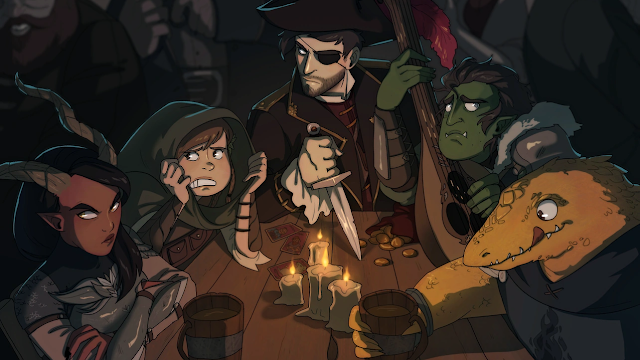Well, everyone, Oxventure has ended its first main campaign. It's not the first group of their characters we've seen to their end (Blades in the Dark and Deadlands have both run their course, as far as we know). And it's not the end of Oxventure proper, as the players and DM are coming back for a new campaign in a new setting soon.
But, short of potential live shows or hypothetical tie-in literature (which, you know, that's something I do for other franchises so call me), we're leaving the world of Geth behind. The final session felt like a fitting end for this adventure in more ways than one. So, even though I'm sad to see it go, I'm glad that it was here. And all that.
See, Oxventure popped up at a time in my life when I was kind of done with tabletop games—both playing them and watching actual plays. I felt like I'd never be quick enough to roleplay well, smart enough to remember every rule and roll, or emotionally stable enough to deal with aggressive players and DMs. But watching this campaign reset my standards for what D&D, and tabletop in general, should be. And I think they're important things.
You Don't Have to Play to Character Tropes
We've all heard the tropes. You gotta be a horny bard, a dumb barbarian, an edgy rogue. While that's funny in moderation and I'll probably never not laugh at a good old-fashioned horny bard joke, it does lead to the idea of "playing wrong." And characters from the Oxventurers Guild really challenged tropes.
Take Egbert the Dragonborn Paladin. He doesn't seem very Paladin-y. He rarely uses his spells, preferring to use bombs. (I respect this; I love playing Paladins, they're my second-favorite class, but it's hard to remember everything.) But the essence of Paladin-ness is still there. He's seeking atonement for something—and yes, we do eventually find out what. And he prays to a weird sun cow and generally seems attached to doing right thing.
And Corazón de Ballena the Human Pirate Rogue, my unapologetic fave. A Rogue/Rogue multiclass (no, that's not a typo), he presents himself as a heroic swashbuckling pirate. But he's actually a rich kid with daddy issues and probably a massive dose of impostor syndrome. Rather than being a rogue edgelord, he's attention seeking with moments of legitimately powerful character development.
As for the half-orc bard? Well, okay, Dob does have a huge crush on the BBEG, a drow named Liliana. But other than that, he's a lovable goofball who's maybe a little bit self-destructive.
Evil Doesn't Have to Mean Antagonistic
I've had problems in the past playing in parties of multiple alignments. Not recently, mind; in the past, before I came back to gaming. There's a mentality that there are only two ways to play an Evil-aligned character: in a party with other Evil characters in an Evil campaign, or antagonistically and destructively to any Good- or Neutral-aligned characters. But Prudence proves otherwise.
Prudence the Tiefling Warlock is evil. Her patron is Cthulhu, she dreams of ultimate power, she will absolutely simply murder people given the opportunity. But all of this is at odds with her affection for her party. She legitimately cares about them, and this is put to the test more than once. The way this is played is very sweet. In person, she'll use veiled threats as a love language; in private, you might catch her hugging an Egbert-shaped gargoyle because she misses him.
When it comes to the rest of the party, Prudence's evilness is treated as a trait that everyone just kind of lets slide because they like her. Kind of like your friend who's into something you hate, but you let it go because they're your friend. Sure, Prudence is capital-E evil. Sure, she craves ultimate power. Sure, she can summon portals to a void beyond worlds and make an entire cult's eyes bleed with cosmic horror. But she's our friend. Tabletop gaming is, after all, collaborative. Over the table, everyone is on the same side.
Flexibility Makes Things Fun
When Oxventure began, no one was really an expert. It was meant as a brief subscriber milestone bonus, but snowballed into the 6+ year series we have now. And because so many people came in kind of unversed in the world of Dungeons & Dragons, things were (and still are) pretty fast and loose.
Merilwen the Wood Elf Druid is a great example. She was given her Wild Shape ability a level early because, well, it's more fun that way. (Merilwen's chief Wild Shape form is a very specific cat, and I get the sense that turning into a cat was a big part of the Druid appeal.) It also took a bit before she handled spells the way Druids do—that is, preparing spells rather than learning a smaller set. As someone notoriously bad about remembering the whole Prepared Spells thing when I'm playing one of those classes, it was reassuring to see the learning curve handled that way.
In their adjacent Blades in the Dark game, certain mechanics were only added in once other mechanics had been learned. This not only allowed new players to get acclimated, but also made it easier for viewers to comprehend a new system.
One of my big hang-ups about gaming has been the fact that I am a slow learner and I learn by doing rather than memorizing in advance. Seeing the whole Oxventure table be patient with each other's learning experiences, in addition to being willing to be flexible when something outside the rules just works better, made me much more comfortable about expressing my own needs at the table.
Silliness Doesn't Preclude Seriousness
My first game back from my time away from gaming folded because half the players considered it "too silly." From what I could gather, "too silly" meant "not serious all the time." It was a shame, but the DM and other remaining player and I formed a really great group afterward. And, much like the Oxventurers, it proved that silly and serious can coexist.
Oxventure has been called "the rodeo clowns of D&D" and I don't fully disagree—though people forget that being a rodeo clown still requires you to know what you're doing. And their antics haven't stopped them from having some genuinely emotional moments. Dob is an absolute mess, but I did weep a little when he found his sister. Merilwen may kill NPCs with her puns, but she had one of the most powerful moments of the finale. Corazón may be... well, Corazón... but his character development is jaw-dropping when he shows it.
At my own tables, a fully serious character rarely gets away without some humor, and a fully joke character ends up becoming emotionally compelling at some point. The best games have some element of both... or, at least, don't fear leaning one way or the other.
I can't recommend Oxventure enough - their main D&D campaign, their Blades in the Dark and Deadlands campaigns, and their one-shots. I have no idea what's coming next, but I know it's gonna be amazing.











0 comments:
Post a Comment